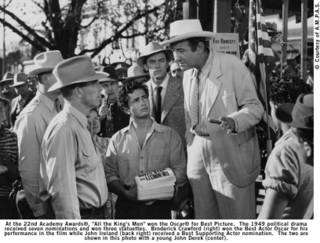
Stark differences
So....where we we?
Bill Monroe, Travelin' Down This Lonesome Road.
Flatt and Scruggs, Foggy Mountain Breakdown.
The Stanley Brothers, Little Glass of Wine.
Bill Monroe could rightly claim he had solely founded a musical movement, had basically hammered it up from scratch. Sure, you could say Louis Armstrong forged jazz, but there was Ellington and Fletcher Henderson and Jelly Roll Morton right there with him. Monroe stood alone--he had created bluegrass music, had become its ambassador and trademark. It was an amazing achievement.
It didn't matter. By 1949, Monroe had become a vengeful, bitter man. The heart of his band, the Blue Grass Boys, had defected. First to leave was Earl Scruggs, who had joined Monroe's band in 1945 and had utterly remade the banjo--turning it from a 19th Century throwback whose role was just to keep the rhythm into a wild lead instrument, using a three-finger playing style that spit out notes at a furious pace.
And soon after Scruggs, Lester Flatt left the band. Flatt was the Blue Grass Boys' lead guitarist and singer, and had co-written most of the band's best songs with Monroe. But like Scruggs, Flatt could no longer take Monroe's unrelenting touring schedule and vicious temperment. Sure enough, he teamed up with Scruggs and other disgruntled Monroe veterans--bassist Howard Watts and fiddler Jim Shumate.
Flatt and Scruggs landed a contract with Mercury in 1948 and issued a series of popular singles, making much greater inroads into mainstream country than Monroe ever had. "Foggy Mountain Breakdown" is pure Scruggs, moving at a tempo that simply demands people to get up on the dance floor.
Even more galling for Monroe was what was happening with Rich-R-Tone Records, an independent record label operating out of Johnson City, Tennessee. Rich-R-Tone's founder Jim Stanton had begun recording all sorts of amateurs playing bluegrass, from West Virginia, southwest Virginia or the hills of North Carolina--pretenders stealing his sound, in Monroe's eyes. Rich-R-Tone's most successful find was two brothers from the Clinch Mountains of Virginia, Carter and Ralph Stanley. While the Stanley Brothers could not match Monroe or Flatt & Scruggs for instrumental virtuousity, they had a timeless quality to their singing that reminded listeners of the old music of their parents and grandparents. (Here is the brothers' own "Little Glass of Wine", recorded on March 1, 1949 in Nashville.)
Bluegrass, after all, is a beautiful reactionary movement. It's a swerve away from country music's mingling with swing in the '30s, as well as the coarse, loud new honky-tonk music. Bluegrass goes back to the well--the songs center around subjects that a 17th Century farmer in Sussex could have related to: God, long-lost loves, death, blue-eyed girls, bad weather. But bluegrass was modernist in its own way--the finger-flaying picking of Scruggs, for example, which even borders on atonality at times, and the breakneck tempo and sophisticated harmonics of Monroe's classic Blue Grass Boys makes bluegrass a sort of country brand of bebop.
The final insult for Monroe was when, in 1949, both the Stanley Brothers and Flatt & Scruggs signed with Columbia, Monroe's label. Disgusted, Monroe left for Decca. His last session for Columbia, on October 22, 1949, produced "Travelin' Down This Lonesome Road." The lead vocal is by Mac Wiseman, with Monroe, playing mandolin, coming in on high tenor for the choruses. Even deprived of the heart of his classic band, Monroe still came through with a great, unbowed performance.
Was the intercine warfare between the great bluegrass players ultimately detrimental to the music's growth? Bluegrass never would become a truly popular music, remaining essentially a cult item until it was discovered by urban folkies in the '60s and since then it has taken the NPR-listening middle class as its patron. But its roots are venomous.
You can find Monroe's final Columbia sessions on 16 Gems. I would recommend Columbia's 2-CD "The Essential Bill Monroe" except the set is far from essential--using the inscrutable, Masonic logic of record companies, Columbia has chosen to stuff the so-called "Essential" compilation with inferior alternate takes of many Monroe classics. A better overall compilation is The Music of Bill Monroe.
The Flatt & Scruggs Mercury recordings can be found here (and you can buy records directly from Mr. Scruggs here); the Stanleys' Columbias are here.
Coming on Friday--the end of the '40s. Break out the hats and hooters.
(and thanks all for the kind words--my goodness, that comments section became something like the end of It's a Wonderful Life--all sorts of people from the neighborhood coming in the door. My greatest apprecation to you all. Here's hoping the legal spy just scoffed at this site and moved on to greener pastures..)
No comments:
Post a Comment